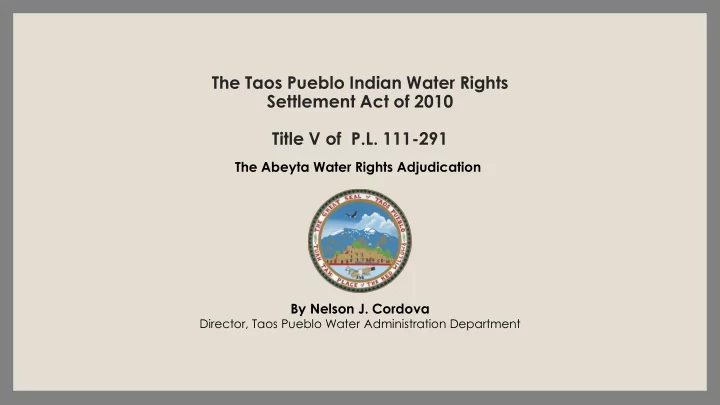

The Taos Pueblo Indian Water Rights Settlement Act of 2010 Title V of P.L. 111-291 The Abeyta Water Rights Adjudication By Nelson J. Cordova Director, Taos Pueblo Water Administration Department
Taos Pueblo – The Place of the Red Willows A World Heritage Site and National Historic Landmark, which has occupied present location since time immemorial. Taos Pueblo people subsisted by hunting and farming. The land base covers 111,000 acres. Current population is 3000. Water resources are Rio Pueblo, Rio Lucero, Rio Hondo, and associated springs and lakes
Settlement Negotiation Parties: Taos Pueblo Arroyo Seco Taos Valley Acequia Village of Taos Ski Valley Association Arroyo Hondo Town of Taos El Prado Water and Sanitation District 12 Taos Area Mutual Tract B Domestic Water Consumers Associations Blue Lake Wilderness State of New Mexico Taos United States of America Pueblo El Prado Land Grant Rio Grande Tract A Town of Taos 2 miles Ranchos de Taos
Water Rights secured to Pueblo through the Abeyta Settlement Historically Irrigated Acreage 7,883.64 AFY Stock Ponds 114.35 AFY San Juan Chama Project 2,215.00 AFY Deep Ground Water 1,300.00 AFY Municipal, Industrial, and Domestic 300.00 AFY Stock Wells 14.72 AFY Rio Grande Depletion Credit 100.00 AFY Total 11,927.71 AFY (Depletion)
Negotiation begins (Convening and Contentious Period) 1989: George H.W. Bush announces policy to negotiate Indian water disputes through negotiations Taos Valley Acequia Association proposal to negotiate Pueblo and acequia claims, accepted by Pueblo Pueblo establishes Water Task Force, appoints two tribal councilmen as spokesmen and negotiators Local parties approve negotiation schedule and set 1995 as year to complete negotiation 2007: Draft Settlement Agreement complete, Tribal Council approval process begins Early negotiations were highly adversarial and contentious Parties agree to Pueblo’s Historically Irrigated Agriculture (HIA) claim 5,712.78 acres
Legislation (the Washington, D.C. process) Pueblo and local parties work to introduce Abeyta legislation, supported by NM Congressional delegation 2008: Pueblo delegates testify before Congressional Committees; 2008 election results improve chance of passage 2010: The Taos Pueblo Water Rights Settlement Act introduced by Senator Jeff Bingaman and Rep. Ben R. Lujan Senate and House pass H.R. 4783, the Claims Resolution Act of 2010 -- includes Taos Pueblo Indian Water Rights Settlement Act of 2010 --
Taos Pueblo signs Settlement Agreement 2010: President Obama signs P.L. 111-291; process to conform Settlement Agreement Act begins 2012: Taos Pueblo Tribal Council approves conformed Settlement Agreement 2013: Governor Susana Martinez signs Settlement Agreement 2014: Pueblo and United States file Joint Memorandum in Support of Joint Motion to Approve and Enter Partial Final Decree on the Water Rights of Taos Pueblo 2016: US and State of New Mexico file notice that Federal and State Appropriations conditions have been achieved October 7, 2016: Federal Register publishes Notice to make the Settlement Final, Binding and Enforceable Governor Laureano Romero and Lt. Governor Gilbert Suazo sign the Settlement Agreement
Settlement Implementation Review Settlement Agreement Implement water sharing agreements Implement Mutual Benefit projects Preserve Buffalo Pasture groundwater and ecology Continue coordination with local parties, NM OSE and Federal entities Address Tribal priorities Protection of the Buffalo Pasture wetland is a core Settlement principle Implementation of the Settlement Agreement is a long term endeavor
Tribal priorities Future Water Administration Department facility Enhance Pueblo water resource management capabilities Implementation of early Settlement projects Improving Pueblo’s irrigation system and infrastructure Implement Pueblo’s Water Code Set up investment plan for water Settlement funds Construct Water Administration Department facility Conduct water supply and demand analysis to address future needs 1908 Pipeline crossing Rio Lucero
Taos Pueblo Tribal Council
Thank you
Recommend
More recommend